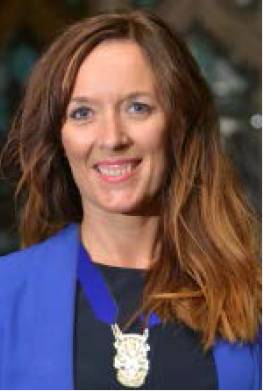CILEx Vice-President
Caroline Jepson:
‘There is much to look forward to’
The career of CILEx Vice-President Caroline Jepson shows what happens when you follow your interests. She spoke to Neil Rose as CILEx prepares to shake up its offer to members.
 Caroline Jepson: CILEx Vice-PresidentIt is always fascinating to see how chance can direct people’s lives. When Caroline Jepson left school in Rotherham with no idea of what she wanted to do, she sent her CV to lots of local businesses; it was a tiny law firm, Arthur Jackson & Co, which replied.
Caroline Jepson: CILEx Vice-PresidentIt is always fascinating to see how chance can direct people’s lives. When Caroline Jepson left school in Rotherham with no idea of what she wanted to do, she sent her CV to lots of local businesses; it was a tiny law firm, Arthur Jackson & Co, which replied.
Her time as an office junior earning £50 a week set her off on a career that now sees her take over as Vice-President of CILEx this year and, of course, as President next.
Caught the bug
Caroline explains how falling into law suited her perfectly. ‘I saw what the lawyers were doing and thought it was very exciting. From that, I just got the bug and started researching law firms in the South Yorkshire area which were likely to open up more career choices.’
This led her, in 1998, to Irwin Mitchell, and she got her foot in the door by taking a typing job in the personal injury (PI) department. ‘I knew that if I got in there, the structure meant there would be opportunities to progress.’
And so it proved – the national law firm is well known for its commitment to staff training, and this is where Caroline heard about what was then ILEX. Irwin Mitchell sponsored her through the course, and such was the number of students the firm supported that it even had a lecturer come into the office twice a week.
She confesses that the course was a lot more difficult than she expected. ‘I failed the first exam I sat [at Level 3] because I was complacent. That gave me the kick up the backside I needed. From that point, it was a case of getting my head down and powering through the rest of it.’
Caroline stayed in PI, moving into catastrophic injury work. ‘It was very me because it’s very people-focused,’ she explains.
But after 15 years at Irwin Mitchell, she started to look for a new challenge. The culture of Irwin Mitchell changed as it mushroomed into the massive organisation it is today: ‘This is not a criticism of Irwin Mitchell, just an observation,’ she stresses and did not fit her quite as well.
She also suspected she was becoming ‘fed up with the hamster wheel’ of target-driven private practice. ‘I thought there might be something else out there.’
She tried a couple of other firms over the following two years – Simpson Millar and Minster Law – which only served to confirm that this was right. It was time to follow a new path.
Dreams come true
‘What I love most about serious injury work was improving people’s lives and their family’s lives,’ Caroline says. ‘I’ve always been heavily involved in rehabilitation, and I could often feel myself getting too drawn into the case management side of the work.’ In particular, she is a big believer in the role of fitness in rehabilitation and getting people moving and active again after a serious injury. This goes hand in hand with a wider interest that saw her qualify as a personal trainer in her spare time.
‘I never thought I’d make a big career out of personal training because it doesn’t pay the mortgage,’ she says, although she has a small business, Fitness Therapy Solutions, working directly with insurers, solicitors, case managers and therapists to provide personal training and nutrition programmes for people following injury.
But all this led to her next job, as a brain injury case manager in Manchester at JS Parker, a specialist brain and spinal injury case manager and rehabilitation company. She recalls how the owner, Jackie Parker, said that not all lawyers would make good case managers, but those who showed deep empathy to their clients would. Caroline fell into that category and was ‘much happier’ doing case management; however, ‘there was still something missing’.